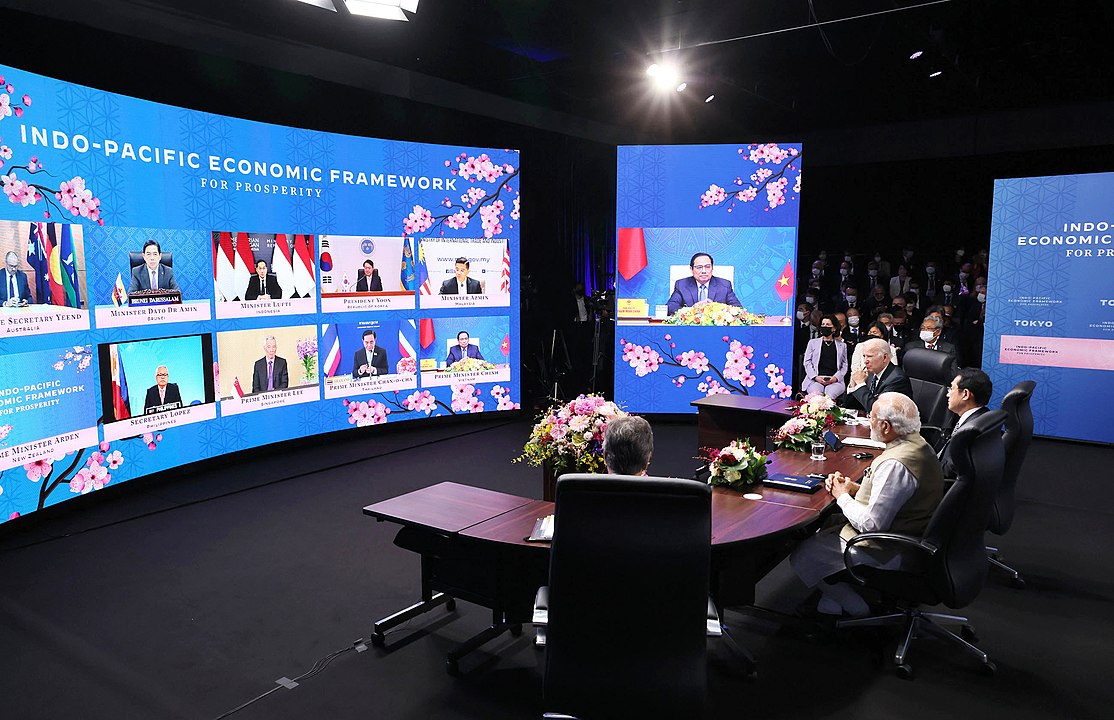Some implications of the digital economy paragraph of the leaked draft ministerial text for IPEF trade pillar
2 September 2022
The Biden Administration has launched a process to establish what it calls an “Indo-Pacific Economic Framework for Prosperity (IPEF)”. The 14 countries currently involved are Australia, Brunei Darussalam, Fiji, India, Indonesia, Japan, Republic of Korea, Malaysia, New Zealand, Philippines, Singapore, Thailand, the United States and Viet Nam.
The US will host the first in-person IPEF Ministerial meeting in Los Angeles from 8-9 September 2022, which is expected to launch formal negotiations. Some countries may decide not to remain involved in some or all of the IPEF’s “pillars”.
IPEF’s Trade pillar
IPEF’s four pillars are described as:
1. trade;
2. supply chain resilience;
3. infrastructure, clean energy, and decarbonization;
4. tax and anti-corruption
The US agenda for the digital economy
A draft ministerial text for the trade pillar dated July 2022 has leaked and includes a paragraph on the digital economy.
Even though the US has said IPEF won’t be just another free trade agreement (FTA), there is intense pressure from its tech industry and some in Congress to build on the e-commerce or digital trade rules designed by the US recent FTAs, starting with the Trans-Pacific Partnership (TPP). These rules severely restrict governments’ ability to regulate new digital technologies, services and data. If they succeed, there is a high risk that references in the leaked text to digital inclusion, trust and equitable growth, and any development flexibilities would be grafted onto and subject to those rules.
IPEF is a US initiative that aims to draw as many Asia Pacific countries into IPEF as possible (except China). Many are developing countries that face a digital divide and have limited regulatory frameworks. Yet the leaked text is silent on differential treatment or development flexibilities.
Read also: IPEF draft ministerial text - trade pillar (Jul 2022)
The leaked text on digital economy
The digital economy paragraph in the leaked text said the IPEF countries will try to achieve
commitments in the areas outlined below. Known problems with those rules are also set out below.
If the negotiating text goes further than the leaked draft, e.g. including rules preventing regulators’ access to source code and algorithms, it will become even more problematic.
- ‘trade rules that address discriminatory practices in key areas’
Requirements to store sensitive data (e.g. personal data for privacy reasons, or tax/financial records to ensure effective regulation) domestically might be said to ‘discriminate’ in favour of local firms and against cross-border service providers and server operators. This seems highly likely since:
-
- the US government has repeatedly said it is seeking IPEF provisions on cross-border data flows/data localization to prevent these kinds of data localization requirements.
- US companies such as Google and Amazon (who are on US government committees on digital economy who advise on these negotiations) have made IPEF submissions to the US government calling for cross-border data flow provisions. Their industry association successfully lobbied for similar rules on cross-border data flows in the TPPA (Arts 14.11 and 14.13).
Other government policies which IPEF rules might target as being discriminatory, and are already in the TPP/CPTPP include:
-
- requirements to use local content (e.g. including locally developed apps or audio-visual content),
- requirements for local presence of offshore service and digital providers (e.g. to ensure they are effectively subject to local laws and enforcement),
- directing government procurement to domestic companies (e.g. to support development of local IT and content firms),
- requirements for technology transfer (e.g. through joint ventures with local SOEs or firms to build national capacity),
- requirements to employ and train local people (e.g. to build a skilled domestic IT workforce).
- ‘provisions on electronic contracts and signatures’
Governments (including the USA) frequently regulate electronic authentication methods to: protect consumers (e.g. requiring that online banking use two factor authentication or credit/debit card numbers are encrypted in transit to stop them being stolen), prevent cyberattacks on critical infrastructure such as oil and gas pipelines, and improve efficiency (e.g. in the administrative systems used by hospitals and health insurance companies). Based on the TPP/CPTPP (Art 14.6) and the World Trade Organization’s plurilateral ecommerce negotiations text (A1.2) companies may be left to decide how secure their electronic authentications are (except for one category of transactions). A similar provision in IPEF would prevent or restrict governments from imposing regulations.
- ‘resilient and secure digital infrastructure in areas such as . . . undersea cables, and internet connectivity’
This is likely to involve interconnection rights that can be very onerous to the host state.
- ‘share best practices on regulatory approaches and policy issues’ … ‘Publication of proposed regulations and allowing a meaningful opportunity for public comment by interested persons’
The USA has been seeking to universalise its non-regulation or light-handed regulation of digital services, technologies and data through FTAs, and is likely to promote this as “best practice” under IPEF. There is a separate paragraph in the leaked text that would ensure the dominant tech companies can lobby and pressure governments not to introduce digital regulations they oppose.
At a time when governments increasingly recognise the need to regulate for problems of
competition, security, human rights, political interference, tax avoidance, among others, in the face of ever-changing technologies and services and the dominance of mainly US tech companies, IPEF risks closing off that policy space and entrenching the highly unequal status quo.






